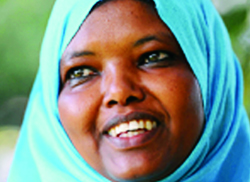
Dekha Ibrahim Abdi was an internationally known and honoured peace-builder and activist who worked as a consultant to governments and civil society organisations. She worked with commitment for over 15 years in peace and conflict resolution, and in development work with pastoralists, countless organizations and communities. She was particularly passionate about education for pastoralists, and worked to improve the provision of education for communities who were constantly on the move. Abdi first encountered violence during her work with pastoralist communities, which laid the foundation for her interest in working for peace. She was a school teacher in Wajir when inter-clan clashes erupted in the town over water and livestock in the early 1990s, claiming 1,500 lives.
Abdi teamed up with three other women in 1993 and came up with a mediation strategy to remedy the situation despite opposition from the traditional leaders. They would listen to the grievances of the concerned parties and address them until a consensus was reached. As a follow-up, they established the Wajir Peace and Development Committee to cement the new-found peace. In 1998, Abdi joined the staff of Responding to Conflict, an international non- governmental organisation (NGO) based at Woodbrooke College in Birmingham. She also became a board member of Co-existence International, and a founding member of a worldwide peace practitioners’ network, Action for Conflict Transformation (ACTION). In 2000, she became part of a consortium developing workshops for the United Nations Department for Economic and Social Affairs, which aimed to assist governments in sub- Saharan Africa in their efforts towards conflict resolution. She additionally served as a Trustee of the Coalition for Peace in Africa (COPA), and the Peace and Reconciliation Oasis (PRO). She was also a member of the Board of the Berghof Centre in Germany.
In 2002, Abdi became the patron of Peace Direct, an NGO based in London. Following the London bombings of 2005, she helped devise a project for young Muslims to explore the challenges of being Muslim and being British. Abdi was also Chair of the Board of the Centre for Peace and Conflict Studies in Cambodia, an institution that promotes peace throughout Asia. In addition, she worked as a consultant trainer on peace building and pastoralists’ development in various divided countries in the world. She wrote extensively on the topic of peace and conflict resolution and contributed to books and presentations on the same. In Kenya, Abdi worked as an advisor to the government on mediation issues, and in 1999 was awarded the Distinguished Medal of Service. During the post-election violence (PEV) that shook Kenya in 2007 and early 2008, Abdi was called upon to help stop the clashes. Her method of data collection during the PEV, Ushahidi, was used as a platform for crowd sourcing of information during a crisis. Along with four others, she convened the Concerned Citizens for Peace (CCP), which worked tirelessly during the clashes to stop the violence. The team worked with citizens, university vice-chancellors, communications companies and civil society groups, among others, to establish where violence was happening, so as to contain and quell it.
Abdi collected many accolades as a peace activist. In 2002, she became patron of the London-based NGO Peace Direct. 2005 saw her achieve a double honour as she was named Kenya Peace Builder of the Year in addition to being nominated for the Nobel Peace Prize as part of a group of 1,000 women for peace across the globe. It was in 2007, however, that she was awarded the Right Livelihood Award, often referred to as the alternative Nobel Prize. She used the prize money to help start a Peace University in Wajir. She was also honoured with the 2009 German Hessian Peace Prize. Before her death in 2011 in a devastating road accident that claimed not only her life but also that of her husband, Abdi was based in Mombasa, supporting peace programmes and helping set up the Oasis of Peace Centre.
